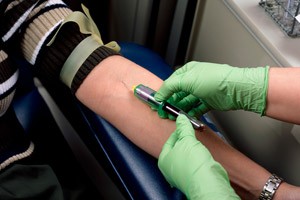 When somebody is charged with driving under the influence of alcohol, the government is responsible for proving all elements of the offense based on clear and convincing evidence. In New Jersey, this can be proved in various ways, but the most common is through the use of blood alcohol evidence to show that the driver was operating a vehicle with a blood alcohol content (BAC) of .08% or higher.
When somebody is charged with driving under the influence of alcohol, the government is responsible for proving all elements of the offense based on clear and convincing evidence. In New Jersey, this can be proved in various ways, but the most common is through the use of blood alcohol evidence to show that the driver was operating a vehicle with a blood alcohol content (BAC) of .08% or higher.
Most people are familiar with the common breathalyzer test, which is used to measure BAC based on a driver’s breath sample. In most cases, the breathalyzer results will make up the only evidence of BAC in a prosecutor’s case. Other times, however, the state may also be able to rely on blood or urine samples to satisfy the government’s burden of proving that a driver had a BAC of .08% or higher when he or she was operating the vehicle.
While the Edward M. Janzekovich law blog has previously discussed the unreliability of urine testing to determine marijuana use, many experts now also believe that urine testing is the least reliable way to determine a driver’s BAC when it comes to proving charges for driving while intoxicated with alcohol.
When Is Urine Testing Used?
Due to the fact that many substances other than alcohol will not be detected by a breathalyzer, police officers may sometimes ask for or get a warrant for a driver’s urine sample if the officer suspects the driver is under the influence of drugs. For example, the presence of marijuana may be in someone’s urine, but there is no currently reliable breath test for marijuana.
Other times, a driver suspected for DUI/DWI may be involved in a motor vehicle accident. If certain injuries occur, such as an injury to the face or nose, or if the driver is hospitalized, a breathalyzer test may not be possible. At those times, a blood or urine test may be requested.
Regardless of why a urine test is obtained, once the state has legal access to a urine sample, the prosecution may seek to use the urine sample as evidence of the driver’s BAC.
The Unreliability of Urine Tests
Importantly, urine tests are considered the least reliable form of chemical test, and can often be effectively challenged in court. In fact, the National Institute of Drug Abuse has found that more than 20 percent of the labs that process urine tests for the presence of drugs and alcohol have reported “false positives.” This means that about 20 percent of the labs reported the presence of drugs or alcohol in drug-free or alcohol-free urine samples.
Furthermore, errors are quite common in urine testing because the technicians analyze water and not blood. BAC results in urine tests are usually inflated because the concentration of alcohol in urine is approximately 1.33 times the concentration of alcohol in blood. Drug screens of urine also tend to confuse similar chemical compounds and can lead to inaccurate results. Urine tests show only the presence of metabolites – inactive traces of previously ingested substances – not the actual drug or alcohol consumed.
Unsurprisingly, New Jersey courts consider urine testing the least scientifically reliable form of chemical test.
Challenging Urine Test Results
Just because you have incriminating urine results does not automatically mean that the state can use this evidence to convict you of a DUI/DWI. Certain protocols must be observed during the administration of a legal urine test in the state. The driver must be given a certain amount of privacy while still ensuring the accuracy of the sample. Drivers should also be instructed to empty their bladders, wait 20 minutes, and then urinate again. There is also strict storage protocol.
Because urine tests are considered to be extremely unreliable in both drunk driving and driving under the influence of drugs cases, it is possible to successfully challenge the results of such tests. If you or someone you know is charged with driving under the influence of alcohol or drugs, you should contact an experienced DWI attorney immediately. An experienced lawyer will know how to identify the potential flaws in a case based on urine test evidence and can incorporate those methods into a solid defense strategy on your behalf.
New Jersey DUI Attorney Edward M. Janzekovich Can Help Even When There Is Evidence of Drunk Driving
DWI/DUI cases can often involve complicated issues of scientific evidence, and successfully challenging that evidence requires knowledge and experience. If you or someone you know is facing a DWI charge, a knowledgeable drunk driving attorney can make all the difference. To speak with an experienced New Jersey DWI lawyer about your situation, call us at 732-257-1137 or contact us online today. We serve clients throughout the state of New Jersey.



